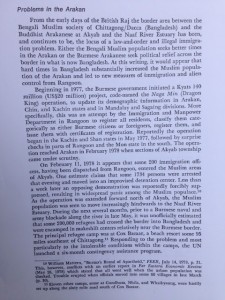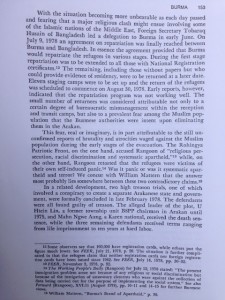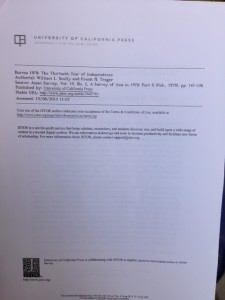Why Are Myanmar’s Rohingya Officially and Popularly Referred to as “Bengali’, a Racist Slur in the Burmese Context?
TRANSCEND MEMBERS, 19 Aug 2013
Maung Zarni – TRANSCEND Media Service
At the heart of Myanmar’s official and, sadly, popular use of the term ‘Bengali’ is a discursive strategy meant to to illegalize, alien-ize and de-tetorrialize the Rohingya one and the same time.
This act is tantamount to the butcher of a verifiable and consequential truth by both the regime and the society, including Burma’s ‘human rights’ leaders such as Suu Kyi, Ko Ko Gyi, etc.
Though the Rohingyas were recognized by the post-independence State in Burma well into the 1970s, after the Naga Min operation the discursively formulated word ‘Bengali’ was used as a matter of policy by the very military leaders who addressed leaders of the Rohingya as ‘Esteemed Rohingya Leaders’. (Dig ex-Brigadier Aung Gyi and his deputies up from their graves and ask them how they called the Rohingya who opposed the Mujahiddeen separatist movement).
Before, the political system was built on official lies manufactured out of the Ministry of Defense Psychological Warfare Department.
Now even the society – un-civil society, I would say – itself is being built on popular lies.
My own alienation as a Burmese by both the State and the society is thus made doubly irreversible.
This double-alienation, among other things, is what enables and empowers me to speak my mind with absolutely no fear of societal and state condemnation and denunciation of me as a traitor.
Here is a contemporary analysis of the earliest wave of State-sponsored Rohingya ethnic cleansing.
This year-end review in the University of California’s Asian Survey includes an early and then fresh analysis of the first last scale Rohingya ethnic cleansing operation as part of the general border control operation called Naga Min or Dragon King, launched in Kachin, Shan and later extended to the Rakhine state.
Dr. Maung Zarni is a member of the TRANSCEND Network for Peace, Development and Environment, founder and director of the Free Burma Coalition (1995-2004), and a visiting fellow (2011-13) at the Civil Society and Human Security Research Unit, Department of International Development, London School of Economics. His forthcoming book on Burma will be published by Yale University Press. He was educated in the US where he lived and worked for 17 years. Visit his website www.maungzarni.com.
Go to Original – maungzarni.com
DISCLAIMER: The statements, views and opinions expressed in pieces republished here are solely those of the authors and do not necessarily represent those of TMS. In accordance with title 17 U.S.C. section 107, this material is distributed without profit to those who have expressed a prior interest in receiving the included information for research and educational purposes. TMS has no affiliation whatsoever with the originator of this article nor is TMS endorsed or sponsored by the originator. “GO TO ORIGINAL” links are provided as a convenience to our readers and allow for verification of authenticity. However, as originating pages are often updated by their originating host sites, the versions posted may not match the versions our readers view when clicking the “GO TO ORIGINAL” links. This site contains copyrighted material the use of which has not always been specifically authorized by the copyright owner. We are making such material available in our efforts to advance understanding of environmental, political, human rights, economic, democracy, scientific, and social justice issues, etc. We believe this constitutes a ‘fair use’ of any such copyrighted material as provided for in section 107 of the US Copyright Law. In accordance with Title 17 U.S.C. Section 107, the material on this site is distributed without profit to those who have expressed a prior interest in receiving the included information for research and educational purposes. For more information go to: http://www.law.cornell.edu/uscode/17/107.shtml. If you wish to use copyrighted material from this site for purposes of your own that go beyond ‘fair use’, you must obtain permission from the copyright owner.


